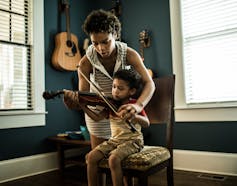How using music to parent can liven up everyday tasks, build family bonds
- Written by Lisa Huisman Koops, Professor of Music Education, Case Western Reserve University
Editor’s Note: Lisa Huisman Koops[1] researches how parents incorporate music into everything from daily chores and routines to family and religious practices. It’s something she believes has taken on more importance now that families are spending more time together in close quarters due to COVID-19. Here, Koops elaborates on the concept of parenting musically and what it involves.
1. What is parenting musically?
Parenting musically[2] is the way I describe what happens when moms and dads use music for many nonmusical tasks and goals. These activities can involve everyday things or ways to better relate to one another. For example, a mother can sing a song to help cue her kids to brush their teeth. Or a father can use a playlist to make Saturday morning chores more fun. Children can also sing songs with grandparents through videoconferencing as a way to deepen their emotional bonds.
These are just some of the ways to get children to see the richness in the ways they can experience the world through music.
2. What are the most interesting examples you’ve seen?
Several families in my research project used music to help develop their child’s identity[5]. For instance, by singing Hungarian folk songs she had learned growing up, one mother encouraged her daughter, Francesca, to sing them over Skype with her grandparents in Hungary.
One couple curated a playlist for their daughter Maggie as a way to nurture her identity as an African American girl growing up in a transracial adoptive family with white parents.
This family intentionally introduced a broad range of musicians, including many who are African American, and talked about the importance of familiarity with music as a form of social meaning.
Other families used music for transitions and rituals. One father composed little songs for his son Joel to help him through his bedtime routine. The songs were cues for what each of them needed to do as well as a joyful way to connect.
Another family, who were observant Orthodox Jews, used music throughout their daily and weekly religious practices and holidays. For instance, the children learned songs at home and school about Purim[6], a Jewish holiday, that explained the background and significance of their celebrations.
3. Does parenting musically involve formal music lessons?
It depends on the family. There can be more than one reason for parents to engage their children in music through formal lessons as well as in everyday life. I’ve found that having several reasons for enrolling kids in music lessons might help keep children interested when enthusiasm flags or practicing becomes a struggle.
 Music lessons involve more than just mastery.
MoMo Productions/Getty Images[7]
Music lessons involve more than just mastery.
MoMo Productions/Getty Images[7]
Parents should communicate whatever their and their children’s hopes and dreams[8] are to music teachers. If a teacher assumes the goal is for my daughter to be the top violinist in a youth orchestra, when my goal is for my daughter to understand and accept that it’s OK to struggle to master a difficult skill, there can be a mismatch that leads to frustration on all sides.
There’s no one right way to parent musically, and no one best way to be musical. Learning informally with online materials, taking time to explore children’s musical passions through listening to music together or rocking out to quarantine parodies - these are all ways to enjoy and grow with music.
For me personally, the goal of parenting musically is to embrace experiences with my four children today that help us navigate hurdles in life, bring us together as a family and develop skills and interests that will be with them throughout their lives.
[You’re smart and curious about the world. So are The Conversation’s authors and editors. You can read us daily by subscribing to our newsletter[9].]
References
- ^ Lisa Huisman Koops (scholar.google.com)
- ^ Parenting musically (global.oup.com)
- ^ (download) (cdn.theconversation.com)
- ^ (download) (cdn.theconversation.com)
- ^ help develop their child’s identity (www.kveller.com)
- ^ Purim (www.britannica.com)
- ^ MoMo Productions/Getty Images (www.gettyimages.com)
- ^ hopes and dreams (doi.org)
- ^ You can read us daily by subscribing to our newsletter (theconversation.com)
Authors: Lisa Huisman Koops, Professor of Music Education, Case Western Reserve University

